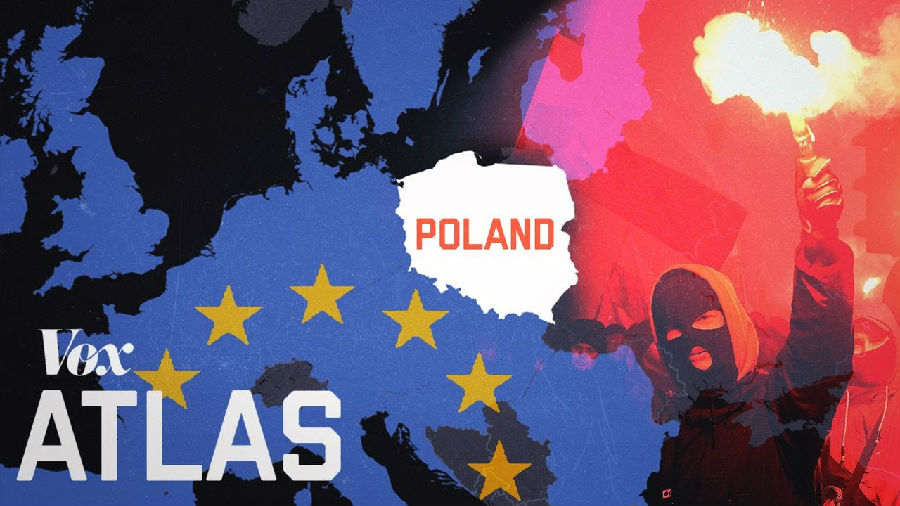(单词翻译:单击)
Poland is changing.
波兰正在改变。
Every year the country celebrates its National Independence Day in the capital, Warsaw.
每年,该国都会在首都华沙庆祝其国家独立日。
There are parades and speeches.
届时会举行大量的游行和演讲。
But in 2017, Poland’s Independence Day made worldwide news because of these signs:
然而,2017年波兰的国家独立日却因为这些横幅登上了世界各地的新闻:
60,000 people showed up for a march led by Nationalist and white-supremacist groups.
6万民众参加了由民族主义和白人至上主义团体领导的游行。
That’s because they have reason to celebrate, too.
这是因为,那些团体也有理由庆祝这一节日。
Poland’s right-wing political party, PiS, is in power.
波兰的右翼政党法律与公正党(简称“PiS”)是该国当前的执政党。
After winning the Presidency and a majority in Parliament,
赢得总统职位和议会的大多数席位后,
they've ignored the constitution, taken over the courts, purged the military, and cracked down on the media.
他们不仅无视宪法,取消了法庭,还清除了军队,对媒体也进行了打压。
PiS is bringing authoritarianism back to Poland and openly rebelling against the European Union.
PiS党对内恢复威权主义统治,对外公开反抗欧盟。
It’s a shocking turn for a country that, just a few years ago, was hailed as one of Europe’s most promising young democracies.
作为一个几年前还被称为欧洲最有前途的年轻民主国家之一,这一转变着实令人震惊。
So, how did this happen? And can it be stopped?
那么,这一切到底是怎么发生的呢?这一局势还能阻止吗?
"It was an old story to the people of Poland - conquest, subjugation, enslavement.
“征服、王国,奴役对波兰人来说早已不新鲜。
it had happened before in Poland’s troubled history but never with such inhumanity."
在波兰波折的历史长河中,这种事情不是没发生过,只不过从未像现在这样不人道。”
Poland had a traumatic 20th century.
波兰的20世纪是一个充满创伤的20世纪。
It was invaded twice during World War Two.
二战期间它被入侵了两次。
First by the Germans and then by the Soviets,
先是德国人,后是苏联人,
who re-established the country after the war, but as a communist state under their control.
后者在战后重建了这个国家,但也将其变成了他们治下的一个共产主义国家。
In fact, Soviet dictator Joseph Stalin directly contributed to a draft of Poland's constitution, which was formalized in 1952.
事实上,苏联独裁者约瑟夫·斯大林直接参与了起草波兰宪法草案一事,该草案于1952年正式确定。
These are his handwritten notes.
这些就是他做的一些笔记。
For the next several decades, Poland developed very little while it was cut off from the rest of the world.
接下来的几十年,被与世隔绝的波兰几乎没有得到任何发展。
It became one of several Soviet-backed, communist countries in Central and Eastern Europe that made up the Soviet bloc.
它成了中欧和东欧几个背靠苏联,构成苏联集团的共产主义国家之一。
That started to change in the 1980s.
这种情况一直持续到了20世纪80年代。
Polish unions started organizing huge strikes against the communist government.
波兰工会开始组织反对共产党政府的大规模罢工。
The movement came to be called Solidarity and it grabbed the attention of the world.
这一运动被称为“团结工会”,并引起了全世界的注意。
As part of the International Day of Solidarity with the people of Poland, we send them this message behind their wall of silence.
在“国际声援波兰人民日”这天,我们要向他们传递一个消息。
In this time of despair, we hold up this candle of hope.
在这个绝望的时代,我们仍然要高举希望的蜡烛。
In 1989, the communist government caved to the pressure and agreed to let non-communist parties run in the elections.
1989年,迫于压力,波兰共产党政府同意让非共产党一起参加选举。
Solidarity and Democratic candidates went on to win the majority of parliament and the presidency.
团结工会和民主党候选人继续把持着议会的大多数席位和总统职位。
They established the Republic of Poland and became the first country in Europe to topple communism.
他们建立了波兰共和国,成为了欧洲第一个推翻共产主义的国家。
The rest of the Soviet bloc soon followed.
苏联集团的其他成员很快也跟着效仿起来。
This posed a challenge for Western Europe.
西欧社会尤其受到了挑战。
"We cannot aim at anything less than the union of Europe as a whole and we look forward with confidence to the day when that union will be achieved."
“我们不能让欧洲联盟被拆散,而且,我们对欧洲变成一个统一的联盟这一天的到来充满信心。”
Since the end of World War Two, the continent’s democracies had been growing closer;
自二战结束以来,欧洲大陆的民主国家越来越紧密了;
signing free trade deals that became the precursor to today’s European Union.
他们签署了自由贸易协议,成了当今欧盟的先驱。
At first, the trade deals just covered coal and steel,
起初,贸易协议只涉及煤炭和钢铁,
but as they grew to include agriculture, energy, and other markets,
但随着协议内容覆盖面扩展到了农业,能源和其他市场,
more countries joined, making Europe more economically and politically integrated than it had ever been before.
加入联盟的国家越来越多,欧洲在经济和政治上的一体化程度也达到了前所未有的高度。
As the former Soviet bloc countries started establishing democracies of their own; Western Europe needed to find a way to include them.
随着前苏联集团各成员国开始建立自己的民主国家;西欧便需要想办法将他们拉到自己阵营。
So in 1993, the established EU countries came up with a strict checklist for admitting new members.
因此,1993年,已加入欧盟的国家严格提出了一个招募新成员的要求清单。
New member-states needed to have a free market economy, respect human rights and the rule of law,
新成员国必须要有自由的市场经济,必须尊重人权和法治,
meaning courts had to be independent and impartial-- so everyone could get a fair trial.
也就是说法院必须独立、公正 - 这样每个人才能得到公正的审判。
These EU rules helped bring former-communist countries in while also keeping them from sliding back into authoritarianism.
这些条款有助于将前共产主义国家纳入欧盟之中,也防止了它们再次陷入专制主义。
They were designed to keep the peace in Europe.
它们的宗旨就是维护欧洲的和平。


